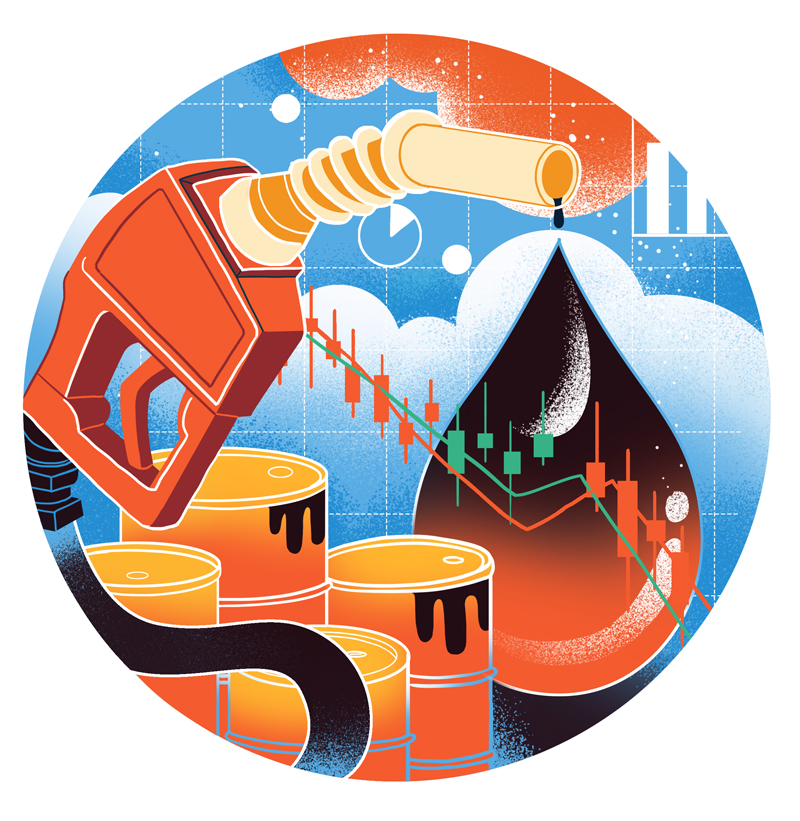Oversupply leads to oil market crash


Editor's Note: The May oil futures contract for US benchmark West Texas Intermediate plunged into negative territory for the first time in history on Monday. What caused this dramatic crash and what will be its impact on the global economy? Two experts share their views on the issue with China Daily's Yao Yuxin and Pan Yixuan. Excerpts follow:
China must be prepared to deal with future shocks
The United States is the world's largest crude oil consumer thanks to its highly developed aviation industry, huge number of private cars and wide range of energy-consuming industries. Yet the novel coronavirus pandemic has forced the United States economy into a virtual lockdown, especially to impose severe restrictions on flights, which has drastically reduced the demand for oil in the country and beyond.
The May West Texas Intermediate plunge reflects oversupply of crude, with collapse in demand dealing a massive blow to the entire industrial chain, from oil fields to refineries, leading to huge stockpiles of crude and rising inventory costs in recent months.
The futures market has mainly two kinds of traders: those from financial institutions that don't need oil but earn profits by betting on the movement of the market, and those from the real economy such as oil companies that work on hedging transaction to reduce the losses caused by price fluctuation.
Even if demand for oil had not fallen, investors, especially speculators, would have had to sell the stored crude before Tuesday when the owner of the contract was technically supposed to take delivery of it. But the colossal imbalance in US supply and demand saw limited buyers. And the lack of available storage capacity greatly increased the cost of holding on to the crude. Worse, given that the pipeline capacity to get the crude out is limited, they may not have found a place to put the oil.
Compared with the deficit of holding on to the contracts and possibly losing more money, the traders took the extreme measure to minimize their losses by essentially paying other market players to take the oil off their hands.
Despite oil prices showing a falling trend recently, many traders speculated on the prices recovering later. And as the May WTI headed toward its expiry date on Tuesday, they desperately exited the market, causing the crash.
Even though speculation is part of futures trade, Monday's market crash is unprecedented, and with supply overwhelming demand, US crude tumbled to an 18-year low. The crash, in fact, means investors are pessimistic about market prospects.
The oil market crash will also batter the pillar industry of Middle East countries, forcing them to abandon investments in US assets to support domestic livelihoods, which in turn would intensify the debt pressure on Wall Street.
Below-zero oil prices should also put China on high alert. Given the potential of the US facing a debt crisis, which could also affect other parts of the world, China should keep stimulating domestic demand to offset the negative effects of the international market becoming sluggish in the future. Indeed, the Chinese authorities are gradually resuming economic activity at home, but they also have to extend financial support to domestic oil companies in order to help them survive the market crash and ensure China's energy security.
Negative oil price a short-term shock
The grounding of airlines, restrictions on movement of vehicles, and suspension of production in many countries to contain the pandemic have radically reduced the global demand for energy.
In the US, investors in the oil market prefer trading in futures, not physical barrels of oil. In a futures contract, the actual delivery of oil is carried out at a later date. Futures trading is of great help to traders, as it allows them to lock into prices, facilitate price speculation by selling or buying with small amount of margin deposit, and leverages up the investors' returns as well as risks. And those who speculated on the oil prices, didn't want to hold onto physical commodity for fear of incurring extra costs for transporting the crude or keeping it in reserves in the oversupplied environment, so they got out of the May WTI contract before it expired on Tuesday. Plus, those who took wrong positions in the calendar spread trading, and drew enormous pleasure from the margin call, exited the market by underselling, and caused the crash.
Suppose the oil price for June WTI is $11.00 a barrel and financial institutions learned a lesson from the crash to reduce leverage and risk exposure, the negative price will not last long.
However, the oil market crash paints a gloomy picture of the future global finance market. The below-zero oil price means the continuous falling oil price risks having a ripple effect on the global oil chain, which can threaten the global financial system's stability.
And combined with some of the effects the 2008 global financial crisis that continue to linger, the troubles in the long industrial chain of US oil could impact the job market. Albeit, the Organization of the Petroleum Exporting Countries and non-OPEC oil producers, including Russia, known as OPEC+, cannot help restore the market by cutting output by 9.7 million barrels per day.
Given these facts, China should make efforts to boost domestic demand to leverage the shrinking global demand, which has reduced the country's exports. Derivatives regulation should also be strengthened.
And the best way, seemingly the only way, to improve the global economy and thus global demand, is by making greater efforts to contain the pandemic and resume production and consumption as soon as possible.
Dong Xiucheng, a professor at the School of International Trade and Economics, University of International Business and Economics
Wu Haifeng, a researcher and associate professor at the Shenzhen Finance Institute
The views don't necessarily reflect those of China Daily.


































